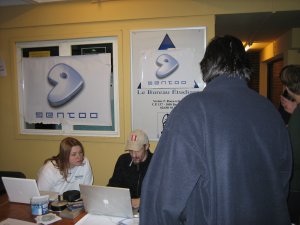Monday, March 13. 2006
Gentechnik in Leingarten
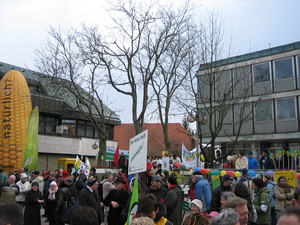 In Leingarten bei Heilbronn soll im kommenden Sommer auf einem Feld Genmais angebaut werden. Gestern fand eine Demonstration mit etwa 500 Menschen statt.
In Leingarten bei Heilbronn soll im kommenden Sommer auf einem Feld Genmais angebaut werden. Gestern fand eine Demonstration mit etwa 500 Menschen statt.(Achtung, bösartige Polemik) Verfolgte man die gehaltenen Reden, so konnte man den Eindruck bekommen, dass es vor allem zwei Gründe gibt, gegen die grüne Gentechnik zu sein: Erstens weil gerade in Baden-Württemberg Wahlkampf ist und zweitens weil man es irgendwie aus der Bibel herauslesen kann. Beide Argumente finde ich nur bedingt überzeugend.
Insbesondere die Vereinnahmung durch Parteien, die in ihrer Regierungszeit auf Bundesebene eine nicht unwesentliche Mitverantwortung für die momentane Situation tragen, stößt mir gerade bei dem Thema immer wieder übel auf.
Wenn ich Zeit und Lust habe, gibt's vielleicht in den nächsten Tagen noch 1-2 Artikel zu den Gründen, warum ich inzwischen eine sehr dezidiert ablehnende Meinung zur grünen Gentechnik habe (was früher nicht unbedingt so war) und zur rot-grünen Gen-Politik, da es ein recht eindrucksvolles Beispiel ist, wie politische Entscheidungen verschleiert werden ("Wir setzen ja nur eine EU-Richtlinie um").
Thursday, March 9. 2006
Petition für freie Geodaten
Via Indymedia: Auf EU-Ebene ist gerade eine Richtlinie in der Diskussion, bei der es um die Frage der Besitzverhältnisse von Geodaten geht. Eine Petition setzt sich für die freie Verfügbarkeit dieser Daten ein.
Das weckt Erinnerungen, als vor einigen Jahren massenweise private Webseiten abgemahnt wurden, weil sie Kartenausschnitte für Wegbeschreibungen genutzt haben. Insbesondere in »Web 2.0«-Zeiten sind solche Daten für eine Vielzahl von Diensten notwendig.
Erfreulich zu sehen, dass es in immer mehr Bereichen Leute gibt, die sich um die Belange der freien Zugänglichkeit von Daten Gedanken machen.
Das weckt Erinnerungen, als vor einigen Jahren massenweise private Webseiten abgemahnt wurden, weil sie Kartenausschnitte für Wegbeschreibungen genutzt haben. Insbesondere in »Web 2.0«-Zeiten sind solche Daten für eine Vielzahl von Diensten notwendig.
Erfreulich zu sehen, dass es in immer mehr Bereichen Leute gibt, die sich um die Belange der freien Zugänglichkeit von Daten Gedanken machen.
Reverse engineering onlinetvrecorder
onlinetvrecorder, a service that let's you record broadcasts from some german television stations, provides it's files in .otrkey-format, which can be decoded using their binary otrdecoder-tool, considering you have requested the recording in advance.
As there is no information how the format and authentication work, I had a deeper look at it.
Getting the key
Using some network sniffer, the authentication is very simple, it just requests them with http, the URL is
http://www.onlinetvrecorder.com/uncrypt.php?email=[email]&pass=[pass]&filename=[file]
(filename is the .wmv-name without otrkey)
Inside that file is an ascii/hex-encoded number with 128 bit. That very much looks like a key.
This already gives us the possibility to manually download the key and, if we want to re-decode some movie (because we lost the wmv or because we want to decode a file before it's completely downloaded to already start watching the recording), save the key to a local webserver as uncrypt.php, forward the hostname to 127.0.0.1 and re-start otrdecoder.
The cryptography
From what I found out yet, the file is encrypted with some sort of blowfish. The encrypted and decrypted files are exactly the same size, that means we have no IV and a variant of blowfish that does no padding.
The best I got till now was using mcrypt with ecb-mode:
mcrypt -d -a blowfish-compat -s 16 -o hex -b --noiv -m ecb --nodelete -f [keyfile] [file]
This decrypts the first 256 bytes correctly, after that it seems to mix up things (the correct decryption continues at byte 512). From what I read in Schneier[1996] (»Applied cryptography«), there is an ecb variant using ciphertex stealing that avoids padding. I found no easy-to-use implementation of that.
Having a commandline-cryptography tool that supports more options than mcrypt would be handy here.
As there is no information how the format and authentication work, I had a deeper look at it.
Getting the key
Using some network sniffer, the authentication is very simple, it just requests them with http, the URL is
http://www.onlinetvrecorder.com/uncrypt.php?email=[email]&pass=[pass]&filename=[file]
(filename is the .wmv-name without otrkey)
Inside that file is an ascii/hex-encoded number with 128 bit. That very much looks like a key.
This already gives us the possibility to manually download the key and, if we want to re-decode some movie (because we lost the wmv or because we want to decode a file before it's completely downloaded to already start watching the recording), save the key to a local webserver as uncrypt.php, forward the hostname to 127.0.0.1 and re-start otrdecoder.
The cryptography
From what I found out yet, the file is encrypted with some sort of blowfish. The encrypted and decrypted files are exactly the same size, that means we have no IV and a variant of blowfish that does no padding.
The best I got till now was using mcrypt with ecb-mode:
mcrypt -d -a blowfish-compat -s 16 -o hex -b --noiv -m ecb --nodelete -f [keyfile] [file]
This decrypts the first 256 bytes correctly, after that it seems to mix up things (the correct decryption continues at byte 512). From what I read in Schneier[1996] (»Applied cryptography«), there is an ecb variant using ciphertex stealing that avoids padding. I found no easy-to-use implementation of that.
Having a commandline-cryptography tool that supports more options than mcrypt would be handy here.
Posted by Hanno Böck
in Computer culture, Cryptography, English, Linux
at
21:17
| Comments (4294967295)
| Trackbacks (2)
Sunday, March 5. 2006
DSL-Modem Internals
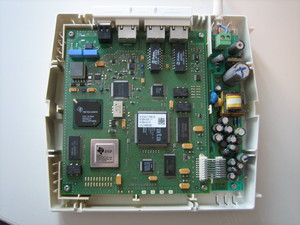 Nachdem sich nebenstehend abgebildetes DSL-Modem in's Reich des Elektroschrotts verabschiedet hat (und ich erfreulicherweise sowas noch im Schrank liegen hatte, sonst könnte ich jetzt nicht bloggen), hab ich das Gerät mal etwas genauer betrachtet (obwohl Hardwarebasteln nicht gerade zu meinen Fähigkeiten gehört).
Nachdem sich nebenstehend abgebildetes DSL-Modem in's Reich des Elektroschrotts verabschiedet hat (und ich erfreulicherweise sowas noch im Schrank liegen hatte, sonst könnte ich jetzt nicht bloggen), hab ich das Gerät mal etwas genauer betrachtet (obwohl Hardwarebasteln nicht gerade zu meinen Fähigkeiten gehört).Es handelt sich um ein originales Telekom/Siemens-Gerät und dürfte zu einer sehr frühen Generation gehören (war unser erstes DSL-Modem).
Nebst den für den gewöhnlichen Betrieb benötigten Anschlüssen 10BT und BBAE befand sich noch eine weitere Buchse mit der Beschriftung ATM (was wohl sowas wie ein High-End-Netzwerkstandard auf der Ebene von Ethernet ist), sowie ein zugeschraubter, etwas ungewöhnlicher Anschluss, der aus zwei quadratischen und zwei runden Öffnungen (je circa 1 mm Durchmesser) besteht, vermutlich für Wartungsarbeiten, Firmwareupdates o.ä..
Das Gehäuse ist so konstruiert, dass es sich praktisch nicht zerstörungsfrei öffnen lässt (insofern besser nicht mit Geräten ausprobieren, die noch funktionieren sollen), eine Reparatur dürfte somit nicht vorgesehen sein. Die entsprechenden Verhakungen lassen sich jedoch einfach mit einem Schraubenzieher aufbrechen.
Die Beschriftung der Chips sollten sich auf nebenstehendem Bild lesen lassen.
Für kreative Verwendungszwecke bin ich offen, bitte in die Kommentare posten.
Friday, March 3. 2006
Neue Fahrkartenautomaten
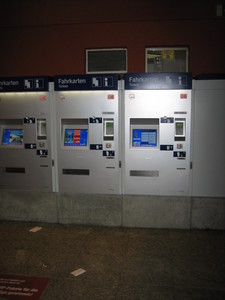 Ich wollt mal eher ungewohnt etwas positives über die Bahn sagen.
Ich wollt mal eher ungewohnt etwas positives über die Bahn sagen.Ich weiss nicht, wie das anderswo ist, aber um Stuttgart herum werden gerade neue Fahrkartenautomaten aufgestellt. Während die älteren Modelle die Angewohnheit hatten, nach jedem Touchscreen-Tastendruck erstmal eine Kaffeepause einzulegen, reagieren diese prompt. Zwar hat das Interface immer noch einige Designschwächen, so gibt es nach wie vor unsägliche »Bitte klicken sie auf WEITER«-Stellen ohne erkennbaren Sinn, aber zumindest wenn man weiss, was man will, lassen sich diese Automaten um einiges effizienter bedienen.
Außerdem kann man auch VVS-Karten am selben Automaten kaufen, was ebenfalls sehr sinnvoll ist. Das Killerfeature wäre jedoch, wenn man von fremden Verkehrsverbünden Karten kaufen könnte. Ich habe nämlich nicht selten die Konstruktion, dass ich bspw. von Karlsruhe irgendwo in den VVS fahren will und es günstiger wäre, im VVS mit einer Verbundkarte zu fahren.
Monday, February 27. 2006
Fosdem 2006 notes
As there was only very limited internet access at Fosdem, I didn't find the time to blog live, so here my collected impressions.
Keynote with Richard Stallman about software patents. I already knew this talk, so it wasn't so interesting. I also think there weren't much people in the room that had to be persuaded to resist software patents, so they should have probably choosen a more »visionary« topic for RMS to talk about. After that an interesting talk about the GPL v3 (also by RMS). I asked a question about the problem that GPL v2 only code can't be mixed with GPL v3 code, he asked me to email discuss this with him, what I will do.
There were two talks about Xgl, one from Matthias Hopf telling what xgl is, what problems they face and some compiz presentation (with the always-known whooo-effect). Zack Rusin did a »Why Xgl is not the answer« talk. Was very interesting to hear the pros and cons of Xgl, I don't have a real opinion on that (I don't feel that I understand the technical details enough), but we should probably have an eye on the different futures X has (Xgl and aiglx at the moment).
Another very interesting talk in the X room: Stephane Marchesin is working on reverse-engineering nvidia chipsets and intends to write a free driver for them. It's in a very early stage (basically at the moment just finding out how the chips work), let's wish him all success (see nouveau - his not yet working first sources).
Suse gave out free (as in beer) t-shirts, so don't be amazed if you see me with a suse t-shirt running around ;-)
Some other more or less interesting talks, overall the presentations are the highlights of fosdem, you'll probably hardly find another event with so many interesting, high level talks about open source and free software.
Pictures will be here as soon as I find time to upload them.
Keynote with Richard Stallman about software patents. I already knew this talk, so it wasn't so interesting. I also think there weren't much people in the room that had to be persuaded to resist software patents, so they should have probably choosen a more »visionary« topic for RMS to talk about. After that an interesting talk about the GPL v3 (also by RMS). I asked a question about the problem that GPL v2 only code can't be mixed with GPL v3 code, he asked me to email discuss this with him, what I will do.
There were two talks about Xgl, one from Matthias Hopf telling what xgl is, what problems they face and some compiz presentation (with the always-known whooo-effect). Zack Rusin did a »Why Xgl is not the answer« talk. Was very interesting to hear the pros and cons of Xgl, I don't have a real opinion on that (I don't feel that I understand the technical details enough), but we should probably have an eye on the different futures X has (Xgl and aiglx at the moment).
Another very interesting talk in the X room: Stephane Marchesin is working on reverse-engineering nvidia chipsets and intends to write a free driver for them. It's in a very early stage (basically at the moment just finding out how the chips work), let's wish him all success (see nouveau - his not yet working first sources).
Suse gave out free (as in beer) t-shirts, so don't be amazed if you see me with a suse t-shirt running around ;-)
Some other more or less interesting talks, overall the presentations are the highlights of fosdem, you'll probably hardly find another event with so many interesting, high level talks about open source and free software.
Pictures will be here as soon as I find time to upload them.
Thursday, February 23. 2006
FOSDEM trip
 FOSDEM, the Free and Open source Software Developers' European MeetingFOSDEM, the Free and Open source Software Developers' European Meeting, will start on saturday. The schedules sound quite interesting.
FOSDEM, the Free and Open source Software Developers' European MeetingFOSDEM, the Free and Open source Software Developers' European Meeting, will start on saturday. The schedules sound quite interesting.Tomorrow I'll start my trip to Brussels and hopefully will also find some time to visit the city.
Maybe I'll have a small presentation of the xgl-overlay. If you are also there, this is the chance to meet me in reality and probably exchange some pgp-keys or such.
Wednesday, February 22. 2006
IFPI versus Internet
Ein bißchen Marketinggewäsch von der Internationalen Organisation zur Bekämpfung von technischem Fortschritt und Verhinderung von Kreativität (auch IFPI genannt):
»Eingrenzung des Sendeprivilegs auf traditionellen Hörfunk. Die Begrenzung der Rechte von ausübenden Künstlern und Tonträgerherstellern auf einen reinen Vergütungsanspruch ist für neue Übertragungsformen (Near-on-Demand-Dienste und Internet-"Radio") wegen des damit verbundenen Eingriffs in die Erstverwertung nicht hinnehmbar.«
Übersetzen wir das mal: Hebt Eure alten Röhrenradios auf! Wenn jemand auf die Idee kommt, dass man Audiodaten auch über digitale Netze übertragen kann, dann ist das »nicht hinnehmbar« und überhaupt "Radio" nur in Anführungszeichen. UKW, that's it, wir pfeifen auf's digitale Zeitalter.
(via Zeitspuk, Quelle hier)
»Eingrenzung des Sendeprivilegs auf traditionellen Hörfunk. Die Begrenzung der Rechte von ausübenden Künstlern und Tonträgerherstellern auf einen reinen Vergütungsanspruch ist für neue Übertragungsformen (Near-on-Demand-Dienste und Internet-"Radio") wegen des damit verbundenen Eingriffs in die Erstverwertung nicht hinnehmbar.«
Übersetzen wir das mal: Hebt Eure alten Röhrenradios auf! Wenn jemand auf die Idee kommt, dass man Audiodaten auch über digitale Netze übertragen kann, dann ist das »nicht hinnehmbar« und überhaupt "Radio" nur in Anführungszeichen. UKW, that's it, wir pfeifen auf's digitale Zeitalter.
(via Zeitspuk, Quelle hier)
Monday, February 20. 2006
Spielen verboten
Annette Schavan, Bundesministerin für Bildung und Forschung (dieselbe Person, die zu ihrer Zeit als Kultusministerin in Baden-Württemberg den kalten Krieg in Form von Berufsverboten wieder aufleben ließ), fordert Einschulung bereits ab dem dritten Lebensjahr (via unreflektiertes blog).
Zitat focus online:
Noch vor zehn Jahren seien viele der Meinung gewesen, Kinder in diesem Alter sollten spielen, nicht lernen. "Über diese Phase sind wir heute zum Glück hinweg", so Schavan.
Dazu fällt mir echt nix mehr ein.
Zitat focus online:
Noch vor zehn Jahren seien viele der Meinung gewesen, Kinder in diesem Alter sollten spielen, nicht lernen. "Über diese Phase sind wir heute zum Glück hinweg", so Schavan.
Dazu fällt mir echt nix mehr ein.
Friday, February 17. 2006
ver.di Streik
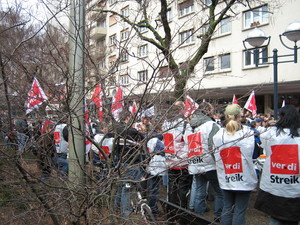 Mal was aus der Kategorie »kein Blogger-Thema«: Ich wollte mich hiermit uneingeschränkt solidarisch mit dem ver.di-Streik erklären. Die öffentliche Hetze, die da gerade in den allgemeinen Medien abgeht, ist schon ausgesprochen widerwärtig (mag man bspw., quer über alle Parteigrenzen, hier in der Welt nachlesen).
Mal was aus der Kategorie »kein Blogger-Thema«: Ich wollte mich hiermit uneingeschränkt solidarisch mit dem ver.di-Streik erklären. Die öffentliche Hetze, die da gerade in den allgemeinen Medien abgeht, ist schon ausgesprochen widerwärtig (mag man bspw., quer über alle Parteigrenzen, hier in der Welt nachlesen).Ganz besonders kreativ im Umgang mit den Streikenden zeigt sich im übrigen die Stadt Osnabrück (siehe Indymedia-Bericht): Sie stellt 1-Euro-Jobber als Streikbrecher ein. Ich erinnere mich ja dunkel, dass der Zweck von 1-Euro-Jobs "gemeinnützig" sein muss und nicht "dem Ersetzen anderer Arbeitsplätze" dienen darf. Ich halte es ja für eine etwas eigenwillige Interpretation, dass Streikbruch da drunter fallen soll.
Thursday, February 16. 2006
Copyleft film about New Orleans after hurricane Katrina
As the german newspage heise reports, there's a new copyleft film, a documentary about New Orleans half a year after hurricane Katrina.
Their website dropping knowledge seems to be down at the moment. I'll post a review as soon as I got it and found time to watch it (this may take some days, because I've got university scrutinies next week).
Update: As Netzpolitik reports, this film is not really copyleft, it's released under a cc-by-nc-nd (creative commons attribution noncommercial no derivatives) license. Beside that, the page's javascript has problems with konqueror (and I always ask myself why this obvious connection between free culture and free software seems to be so difficult).
Their website dropping knowledge seems to be down at the moment. I'll post a review as soon as I got it and found time to watch it (this may take some days, because I've got university scrutinies next week).
Update: As Netzpolitik reports, this film is not really copyleft, it's released under a cc-by-nc-nd (creative commons attribution noncommercial no derivatives) license. Beside that, the page's javascript has problems with konqueror (and I always ask myself why this obvious connection between free culture and free software seems to be so difficult).
Posted by Hanno Böck
in Copyright, English, Movies, Politics
at
12:33
| Comments (0)
| Trackbacks (0)
Wednesday, February 15. 2006
Rant: Printing with cups
Okay: If you regularly read my blog, you know that I'm a linux addict and free software fan. I really like my linux, I'm much more comfortable with it than the bad old days when I used this other system from this redmond company. I have the strong belief that free software is the better concept and will succeed on the long run. Just to make clear that this is a very rare situation when I rant about linux.
So let's start: Today I wanted to print some slides from a university lecture. They were landscape format and to save paper (52 pages), I wanted to print four of them on one page. A simple task one should think.
Started kpdf, clicked on print. As my cups was configured, I could select my printer, go to it's options and found a 4 pages on 1 option, so it seemed fine. Clicked on Print. Waited. Waited. Nothing happened.
Webbrowser, localhost:631, no printing jobs. No errors. Nothing.
Looked at the logfile (this is at least the point where every common user wouldn't come further). Nothing that helped, just a note to change loglevel to debug. Did that. Restarted cups. Re-sent page. Logfile showed up some segfault in a gs-command. Damn, why can't just the interface tell me that?
From the small knowledge I have about linux-printing, I knew that there are various implementations of ghostscript. Looked into portage, found three, replaced ghostscript-esp with ghostscript-afpl. Restarted cups.
Tried to print, my printer actually did something. Well, it looked interesting. I had the third page in the upper left corner and about a third of the fourth page beside it. Beside that, far smaller than it should be, nearly unreadable.
Ok, there are some other pdf-viewers out there. Tried kghostview. Print, select 4 pages option, etc. Printer started doing something.
The result was really interesting: The pages were printed white on white.
Next try, evince. As evince is a pretty new gnome-tool, it sticks to the gnome guidelines: Less config-dialogs, less features. It just had no possibility to print four pages on one. Oh, should I mention that evince crashed when I wanted to close the printing dialog?
Gave up. Will read it on the screen.
Conclusion: Free software had some great success in the last years. Today we have systems that can compete to commercial ones in many areas for common usage. Some areas on the other side are really horrible. Printing is one of them.
If we really want to compete on the desktop, we need to get such basic tasks to »just work«.
So let's start: Today I wanted to print some slides from a university lecture. They were landscape format and to save paper (52 pages), I wanted to print four of them on one page. A simple task one should think.
Started kpdf, clicked on print. As my cups was configured, I could select my printer, go to it's options and found a 4 pages on 1 option, so it seemed fine. Clicked on Print. Waited. Waited. Nothing happened.
Webbrowser, localhost:631, no printing jobs. No errors. Nothing.
Looked at the logfile (this is at least the point where every common user wouldn't come further). Nothing that helped, just a note to change loglevel to debug. Did that. Restarted cups. Re-sent page. Logfile showed up some segfault in a gs-command. Damn, why can't just the interface tell me that?
From the small knowledge I have about linux-printing, I knew that there are various implementations of ghostscript. Looked into portage, found three, replaced ghostscript-esp with ghostscript-afpl. Restarted cups.
Tried to print, my printer actually did something. Well, it looked interesting. I had the third page in the upper left corner and about a third of the fourth page beside it. Beside that, far smaller than it should be, nearly unreadable.
Ok, there are some other pdf-viewers out there. Tried kghostview. Print, select 4 pages option, etc. Printer started doing something.
The result was really interesting: The pages were printed white on white.
Next try, evince. As evince is a pretty new gnome-tool, it sticks to the gnome guidelines: Less config-dialogs, less features. It just had no possibility to print four pages on one. Oh, should I mention that evince crashed when I wanted to close the printing dialog?
Gave up. Will read it on the screen.
Conclusion: Free software had some great success in the last years. Today we have systems that can compete to commercial ones in many areas for common usage. Some areas on the other side are really horrible. Printing is one of them.
If we really want to compete on the desktop, we need to get such basic tasks to »just work«.
Monday, February 13. 2006
amaroK 1.4 with moodbar
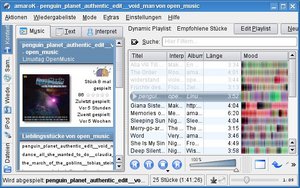 The greatest music player of all time, called amaroK, just had the first beta release of the upcoming version 1.4.
The greatest music player of all time, called amaroK, just had the first beta release of the upcoming version 1.4.The most visible new feature is the so-called moodbar that tries to color the »mood« of a track. Okay, it does a hell of cpu-usage and I doubt it's very useful, but it looks really funky.
Gentooers: emerge sync, add media-sound/amarok to your package.unmask, add use-flag exscalibar, enjoy!
Posted by Hanno Böck
in Computer culture, English, Gentoo, Linux, Music
at
20:51
| Comments (13)
| Trackbacks (0)
More free music
The AStA of the University of Marburg starts it's second Open Music Contest.
Like last year, they'll collection submissions from music artists released under a creatice commons license and will choose the best to be presented on a concert and released on a sampler. Last years sampler is available for download in ogg vorbis format.
Nice project for more free music and open standards.
Like last year, they'll collection submissions from music artists released under a creatice commons license and will choose the best to be presented on a concert and released on a sampler. Last years sampler is available for download in ogg vorbis format.
Nice project for more free music and open standards.
Friday, February 10. 2006
I'm so famous ;-)
Since my xgl-overlay, this happens all the time (from #xorg on freenode):
<...> OMG IT'S HANNO!!!! *BOW DOWN
<...> hello! i read your blog!
<...> hahaha i'm a big fan
<...> ok!
<...> OMG IT'S HANNO!!!! *BOW DOWN
<...> hello! i read your blog!
<...> hahaha i'm a big fan
<...> ok!
« previous page
(Page 39 of 57, totaling 848 entries)
» next page
